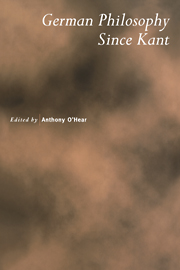Book contents
- Frontmatter
- Contents
- Preface
- Notes on Contributors
- Fichte and Schelling
- Hegel's Critique of Foundationalism in the ‘Doctrine of Essence’
- Schopenhauer's Pessimism
- Karl Marx
- Nietzsche's Virtues: A Personal Inquiry
- Bolzano, Brentano and Meinong: Three Austrian Realists
- Vorsprung durch Logik: The German Analytic Tradition
- German Philosophy of Mathematics from Gauss to Hilbert
- The Revolution of Moore and Russell: A Very British Coup?
- Husserl's Concept of Being: From Phenomenology to Metaphysics
- Frege and the Later Wittgenstein
- Otto Neurath, the Vienna Circle and the Austrian Tradition
- Does the Nothing Noth?
- Reactionary Modernism
- Adorno on Disenchantment: The Scepticism of Enlightened Reason
- Habermas, Science and Modernity
- German Philosophy Today: Between Idealism, Romanticism, and Pragmatism
- The Career of Aesthetics in German Thinking
- Hermeneutic and Analytic Philosophy. Two Complementary Versions of the Linguistic Turn?
- Index of Names
Fichte and Schelling
Published online by Cambridge University Press: 29 September 2009
- Frontmatter
- Contents
- Preface
- Notes on Contributors
- Fichte and Schelling
- Hegel's Critique of Foundationalism in the ‘Doctrine of Essence’
- Schopenhauer's Pessimism
- Karl Marx
- Nietzsche's Virtues: A Personal Inquiry
- Bolzano, Brentano and Meinong: Three Austrian Realists
- Vorsprung durch Logik: The German Analytic Tradition
- German Philosophy of Mathematics from Gauss to Hilbert
- The Revolution of Moore and Russell: A Very British Coup?
- Husserl's Concept of Being: From Phenomenology to Metaphysics
- Frege and the Later Wittgenstein
- Otto Neurath, the Vienna Circle and the Austrian Tradition
- Does the Nothing Noth?
- Reactionary Modernism
- Adorno on Disenchantment: The Scepticism of Enlightened Reason
- Habermas, Science and Modernity
- German Philosophy Today: Between Idealism, Romanticism, and Pragmatism
- The Career of Aesthetics in German Thinking
- Hermeneutic and Analytic Philosophy. Two Complementary Versions of the Linguistic Turn?
- Index of Names
Summary
Intellectual historians have often remarked that German thought from its earliest beginnings is marked by two major features that distinguish it from the greater part of the remainder of Western European thought. These are, first, the tendency to seek some kind of participatory relationship with nature and the universe conceived in quasi-animistic terms, which represents a kind of reversion to a much older, much more primitive way of conceiving the world and man's place in it, and has led to all kinds of mysticism. It is a strain in the history of German thought which has been brought out very clearly by Lévy-Bruhl and others. In all its forms the essential core of this view consists in the thinker's desire to place himself in the position of the creator, to become in some sense privy to his master-plan and, by engaging the productive part of his own nature, thereby himself to enter into the great act of creation by a species of co-creation. The second defining characteristic is that of antinomianism, that is to say, a hatred of laws and rules as such. This usually went hand in hand with a distrust of traditional forms of logic and reasoning and, in the more extreme cases, of all conceptual thought.
- Type
- Chapter
- Information
- German Philosophy since Kant , pp. 1 - 24Publisher: Cambridge University PressPrint publication year: 1999

